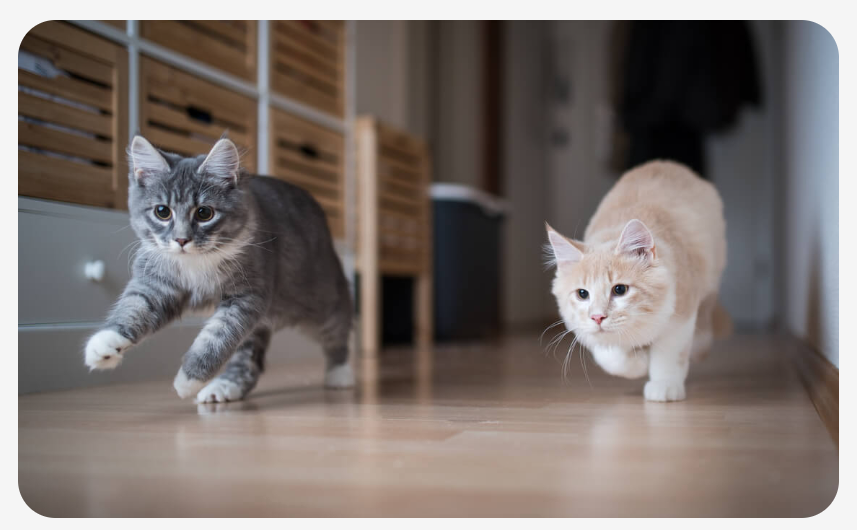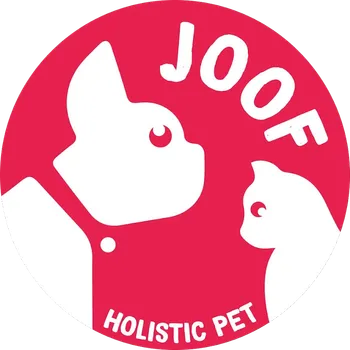How to Improve and Maintain Your Pet’s Gut Health


Your pet’s gut microbiome — made up of trillions of beneficial bacteria and other microbes that live in the gastrointestinal (GI) tract — is a complex, constantly changing ecosystem. The composition and behavior of the gut’s microbial community are influenced by a lot of factors, including age, diet, environment, and medications.
Some factors — like illness, parasite infections, genetic predisposition, and antibiotics — can interfere with the proper functioning of your pet’s microbiome, leading to troublesome symptoms like diarrhea, vomiting, bloating, constipation, or itchy skin. But the good news is that we can use other factors, like diet and supplements, to help the gut microbiome stay strong and healthy. Here are some ways to support and maintain a healthy gut.
Feed Your Dog and Cat a Healthy, Balanced Diet
A healthy diet is the best way to manage the gut microbiome. Since the bacteria that live in the gut help digest your dog’s and cat's food, what you feed your pet influences which groups of gut bacteria thrive and multiply.
- Limit Carbohydrates
Some commercially available pet diets are highly processed foods that contain a lot of carbohydrates, which encourage the growth of particular groups of gut bacteria that love carbs. When these bacteria multiply too successfully, they can crowd out other important bacteria groups, reducing diversity in the microbiome. And some carb-loving bacteria groups are associated with excessive inflammation, which can cause a variety of problems throughout the body.
- Feed Enough Protein
Cats are obligate carnivores (meaning they need to eat meat to survive), so their gut microbiomes function best on a diet that’s high in protein (containing more than 40% protein on a dry-matter basis) and low in carbohydrates.
Dogs are still carnivores, though in living closely with humans over thousands of years, they’ve developed the ability to metabolize a wider variety of foods. A balanced dog diet should be more than 35% protein on a dry-matter basis, should be low in fat, and should include healthy whole grains and other nutritious elements, such as fermented foods.
- Include Fermented Foods
Fermented foods are considered probiotic foods because they contain “friendly” varieties of live bacteria. Since many groups of beneficial bacteria are produced by the fermentation process, fermented foods are an especially good source of these healthy microbes.
Your dog and cat can benefit from small quantities of yogurt, kefir, or fermented goat milk, as long as it’s unflavored and doesn’t contain any artificial sweeteners (which can be harmful to animals). Your dog can even have a little sauerkraut, as long as it’s low in salt. As with any new addition to your pet’s diet, introduce fermented foods very gradually over 7–10 days to avoid digestive upset.
Test Your Cat’s Gut Health


Regular assessments of your dog's and cat’s gut microbiome can help you keep up with any changes before they lead to symptoms. A Gut Health Test once a year — and after any antibiotic use — can tell you whether you need to adjust your pet’s diet, as well as which foods or supplements might be most helpful. If your animal has chronic health issues, like IBD or diabetes, more frequent microbiome testing can give you the information you need to help them live longer, happier lives.
Add Prebiotics, Probiotics, and Postbiotics
One way you can help promote the growth of healthy bacteria in your pet’s digestive tract is by supplementing their diet with prebiotics, probiotics, and postbiotics.
- Prebiotics
Prebiotics are particular sources of dietary fiber that provide food for beneficial gut bacteria. Different bacteria eat different things, so by feeding the right prebiotics, you can encourage the kinds of gut bacteria that will promote your pet’s digestive health and overall wellness. Prebiotics have also been found to help counteract the inflammation caused by a high-fat diet.
Inulin is one prebiotic fiber that’s easy to add to your cat’s food (starting with small amounts). Another is mannan oligosaccharides (MOS), a prebiotic derived from yeast cells that has been shown to improve intestinal health. Fructo-oligosaccharides (FOS) — chains of sugars found in soybeans, Jerusalem artichokes, and asparagus — provide food for certain beneficial gut bacteria. FOS has the advantage of being especially palatable to dogs and cats.
- Probiotics
Microorganisms (usually bacteria) that are consumed for their health benefits are called probiotics. Some probiotic products marketed for dogs and cats may temporarily improve diarrhea, but the bacteria they contain can’t rebalance a disrupted microbiome. That’s because even the leading probiotic products tend to contain large quantities of just a few kinds of bacteria, and usually not ones that are native to pets.
Saccharomyces boulardii is a “friendly” strain of yeast that has been extensively studied for its probiotic effects, documented now in over 250 peer-reviewed articles. This particular probiotic has been shown to resolve diarrhea caused by antibiotics. In a study of dogs with chronic intestinal disease, adding S. boulardii to the standard treatment resolved diarrhea within five days.
By combining this probiotic yeast with prebiotic FOS, our KittyBiome™ and DoggyBiome™ S. boulardii + FOS Powder helps improve your pet’s stool consistency, reduce diarrhea, promote healthy skin, and support gut function.
- Postbiotics
When gut bacteria feed on prebiotics, they break down those prebiotic fiber molecules through a process of fermentation. And that fermentation activity produces waste products, or byproducts, which are referred to as postbiotics. Certain postbiotics have been found to support good gut health in several ways, especially by helping to reduce inflammation.
Our tasty DoggyBiome™ ImmuneShield™ Chews contain a special postbiotic formulation called EpiCor® Fermentate, which has been clinically shown to increase and improve immune function.
Avoid Unnecessary Antibiotics
In some situations, antibiotics can be a valuable, even life-saving treatment. If your pet has a serious infection or an overgrowth of harmful bacteria, a course of antibiotics may be absolutely necessary. But because these drugs tend to kill a lot of beneficial bacteria along with the “bad bacteria,” antibiotics can make drastic, long-term changes in your pet’s gut microbiome.
So if your veterinarian recommends a course of antibiotics, it’s important to ask questions, including which particular bacteria the proposed antibiotic has been shown to work against and whether there are any alternative treatment options to consider.
If your animal does need antibiotics, there’s still a lot you can do to help them feel better during and after treatment. Because antibiotics disrupt the normal functioning of the gut microbiome, diarrhea is a common side effect. Our KittyBiome™ and DoggyBiome™ S. boulardii + FOS Powder is a daily probiotic and prebiotic supplement designed to reduce diarrhea, improve stool consistency, and support healthy gut function.
A substantial body of research has demonstrated that the probiotic yeast S. boulardii resolves diarrhea caused by antibiotics. And animal studies have shown that supplementation with prebiotic fructo-oligosaccharides (FOS) improves both gut health and immune functions.
Other Ways to Improve Your Cat’s Gut Health
The gut microbiome interacts with the body’s other systems in multiple ways, including the gut–brain axis, the system of chemical signals that allows constant communication between the gut and the central nervous system. That’s why the gut microbiome is involved in functions like mental health and cognition as well as digestion and metabolism. And while the gut affects all those different systems, those systems also affect the gut.
- Exercise


One of the reasons exercise is so good for your dog's and cat’s overall health is that it’s good for their gut microbiome. Studies have shown that exercise promotes the growth of various kinds of beneficial gut bacteria, including those that reduce inflammation and help the body maintain a healthy weight.
- Sleep


Sleep is also important for gut health. Researchers have found that good-quality sleep promotes greater diversity in the gut microbiome, which in turn supports the healthy functioning of the brain and immune system.
Extra Help for Older Dogs & Cats and Pets with Chronic Health Conditions


If your pet is older or has a chronic health condition, daily supplementation with prebiotics or probiotics can help the gut microbiome maintain its healthy balance.
We know that as animal age, their microbiomes change. We also know that certain health issues can keep an animal’s gut microbiota permanently out of balance. Many kinds of cancer, for example, disrupt the gut microbiome. Genetic factors may also affect the gut’s microbial balance. In such cases, FMT capsules can help minimize symptoms, so Gut Restore Supplements may be an ongoing element of your pet’s care.
Ongoing microbiome support is especially important for cats & dogs with chronic digestive disorders. For example, if your pet has inflammatory bowel disease (IBD), some steps you can take to manage their symptoms and help them feel better include gut health testing, prebiotic/probiotic or postbiotic supplements, and vitamin B12 injections. Repeated courses of Gut Restore Supplement FMT capsules and/or Gut Maintenance Plus can also help.
*Note that Gut Restore Supplement is currently not available in Singapore.
If your pet’s Gut Health Test finds high levels of E. coli or C. diff, which are both common causes of diarrhea, our KittyBiome and DoggyBiome (GMP) Gut Maintenance Plus can be especially useful. GMP stops occasional diarrhea flare-ups with a unique blend of prebiotics, probiotics, and phages. GMP contains MOS, which activates the immune system, binds to pathogens, and feeds good bacteria; S. boulardii, which has been shown to resolve diarrhea caused by antibiotics; and PreforPro, a blend of prebiotic phages that specifically reduces E. coli and C. diff populations.
